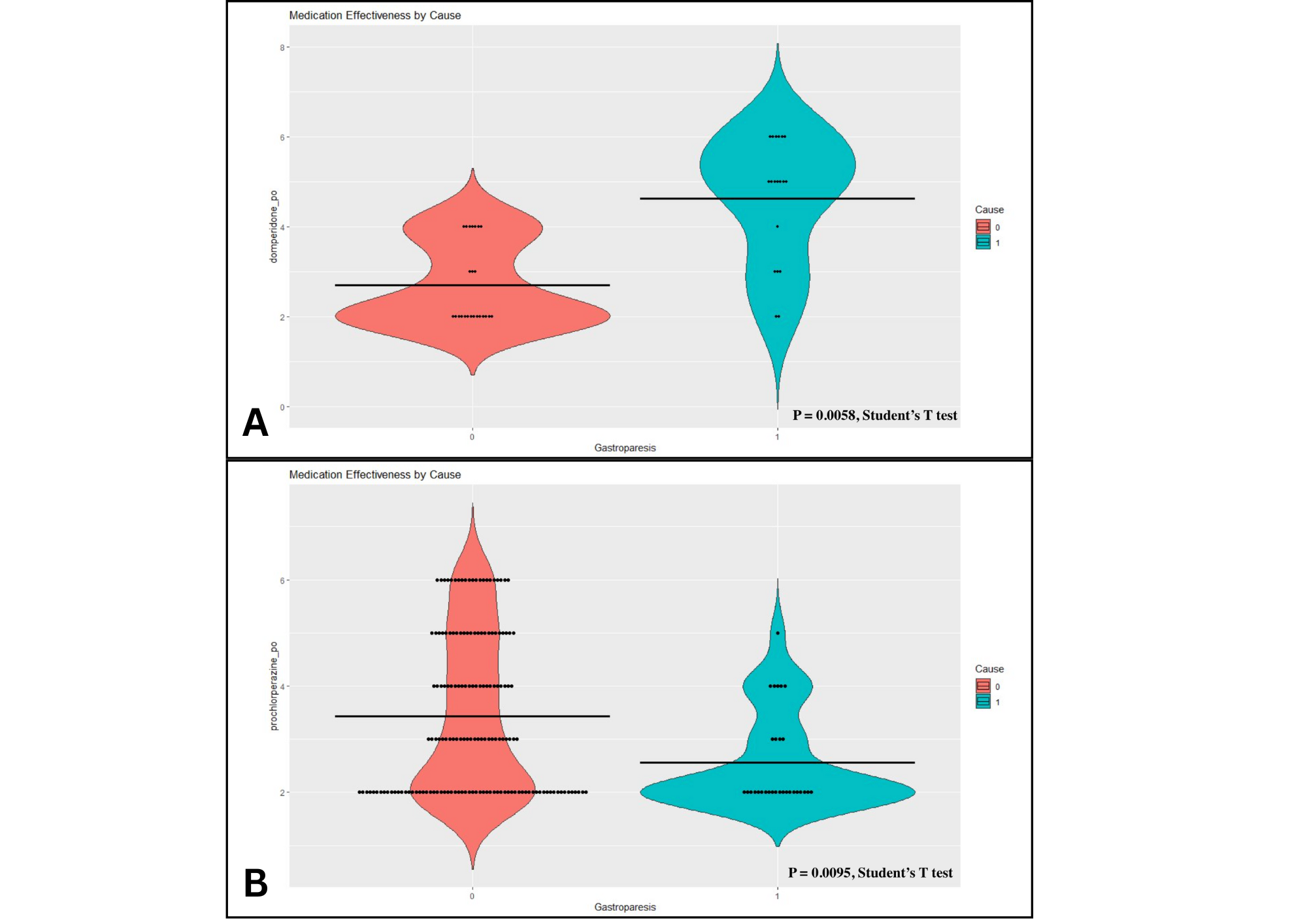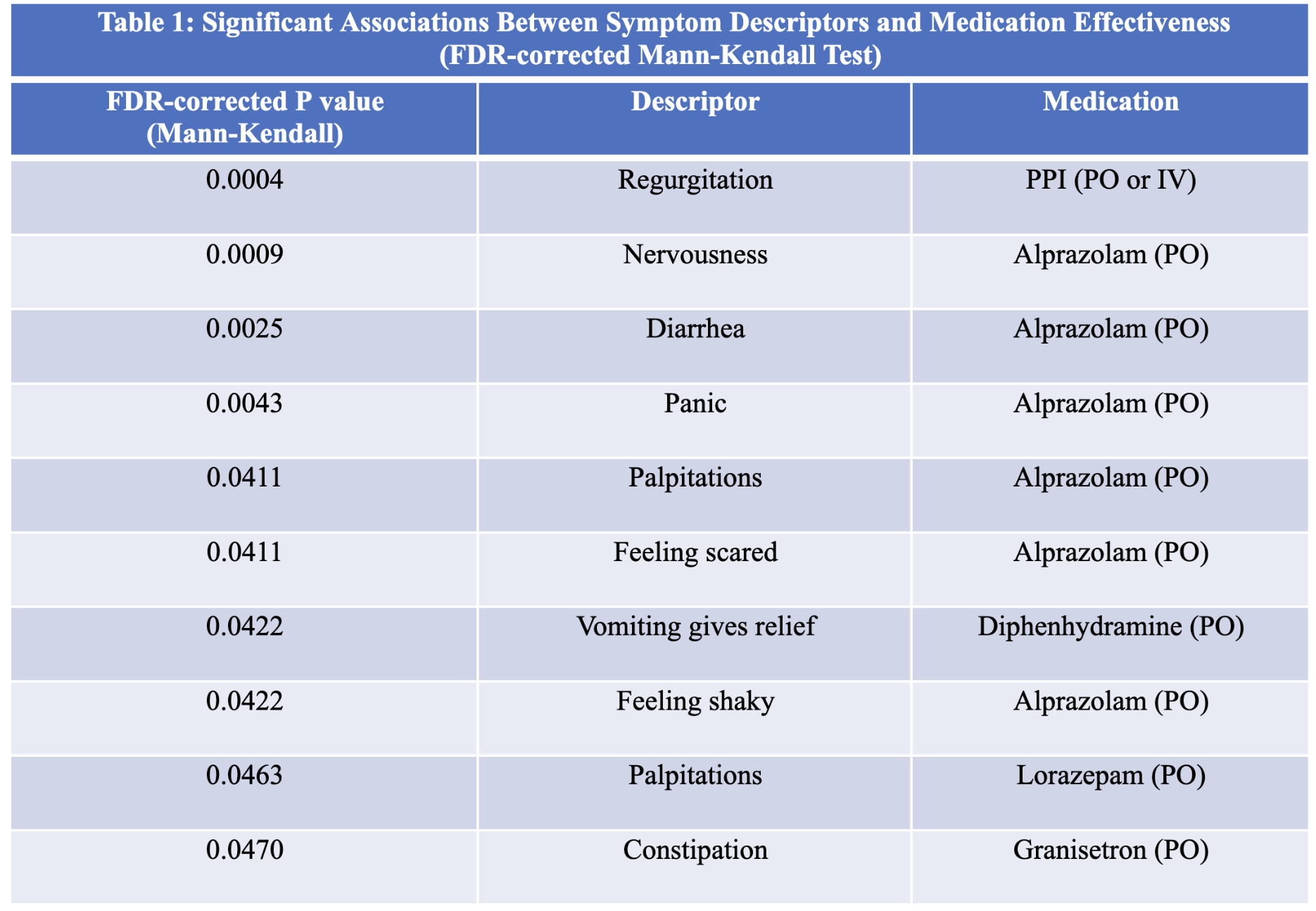Tuesday Poster Session
Category: Functional Bowel Disease
P5068 - The Nausea Atlas: Identifying and Characterizing Nausea Subtypes Using Patient-Reported Information
Tuesday, October 28, 2025
10:30 AM - 4:00 PM PDT
Location: Exhibit Hall
.jpg)
Sneh Sonaiya, MD, MPH, MBA
Kirk Kerkorian School of Medicine at the University of Nevada Las Vegas
Las Vegas, NV
Presenting Author(s)
Sneh Sonaiya, MD, MPH, MBA1, Ken Hui, MD, PhD2
1Kirk Kerkorian School of Medicine at the University of Nevada Las Vegas, Las Vegas, NV; 2Johns Hopkins University School of Medicine, Baltimore, MD
Introduction: Nausea is a common gastrointestinal symptom, affecting up to 50% of people annually and contributing to nearly 1 million U.S. emergency visits each year. Despite its prevalence and reduced quality of life—chronic nausea remains poorly understood and underprioritized. Therapeutic decision-making for nausea remains largely empirical due to limited data on symptom subtypes and treatment response. To address this, we developed The Nausea Atlas, a large-scale, patient-reported dataset aimed at identifying nausea subtypes and informing more personalized treatment strategies.
Methods: We conducted an online survey of individuals recently identified in the electronic medical record as experiencing nausea. The survey included over 200 multiple-choice questions on demographics, symptom patterns, quality of life, suspected causes, triggers, and responses to medications and non-medication therapies. Descriptive and pairwise statistical analyses were used to identify treatment-response associations by nausea subtype.
Results: 745 participants (77% Female; 19% Male), reporting 1200 distinct nausea types/experiences were evaluated. The most represented age range was 31–40 years. 22% of respondents reported their nausea as severely or completely debilitating. Ondansetron was the most effective anti-nausea medication, followed by promethazine, lorazepam, prochlorperazine, and domperidone. Marijuana was the most effective non-medication treatment, outperforming dronabinol. In pairwise analysis, domperidone showed greater effectiveness in gastroparesis (P=0.0058, Fig 1), while prochlorperazine was less effective in gastroparesis (P=0.0095). Inspection of significant associations between descriptors and treatment efficacy revealed that benzodiazepines are particularly effective when anxiety-related features are present with nausea (Table 1).
Discussion: This first large-scale, patient-reported study of chronic nausea identifies both expected and novel treatment-response patterns, validating recall-based data. The differential effectiveness of domperidone and prochlorperazine in gastroparesis underscores distinct nausea subtypes with unique therapeutic profiles. These results support that nausea may be organized along distinct neural and pathophysiologic pathways, each with unique therapeutic profiles. The Nausea Atlas provides proof of concept for a symptom-based framework to personalize nausea management and lays the groundwork for future mechanistic and interventional research.

Figure: Figure 1:
A. Violin plot showing the self-reported effectiveness of domperidone among participants with (blue) and without (red) gastroparesis. Patients with gastroparesis reported significantly higher effectiveness ratings (P = 0.0058, Student’s t-test). B. Violin plot showing the self-reported effectiveness of prochlorperazine among participants with (blue) and without (red) gastroparesis. Effectiveness was significantly lower in the gastroparesis group (P = 0.0095, Student’s t-test).

Figure: Table 1: Significant Associations Between Symptom Descriptors and Medication Effectiveness (FDR-corrected Mann-Kendall Test). This table highlights statistically significant associations between patient-reported nausea descriptors and the perceived effectiveness of specific medications. Results were derived using the Mann-Kendall test with False Discovery Rate (FDR) correction to account for multiple comparisons. Notably, alprazolam was frequently associated with relief in nausea described by autonomic or anxiety-related symptoms.
Disclosures:
Sneh Sonaiya indicated no relevant financial relationships.
Ken Hui indicated no relevant financial relationships.
Sneh Sonaiya, MD, MPH, MBA1, Ken Hui, MD, PhD2. P5068 - The Nausea Atlas: Identifying and Characterizing Nausea Subtypes Using Patient-Reported Information, ACG 2025 Annual Scientific Meeting Abstracts. Phoenix, AZ: American College of Gastroenterology.
1Kirk Kerkorian School of Medicine at the University of Nevada Las Vegas, Las Vegas, NV; 2Johns Hopkins University School of Medicine, Baltimore, MD
Introduction: Nausea is a common gastrointestinal symptom, affecting up to 50% of people annually and contributing to nearly 1 million U.S. emergency visits each year. Despite its prevalence and reduced quality of life—chronic nausea remains poorly understood and underprioritized. Therapeutic decision-making for nausea remains largely empirical due to limited data on symptom subtypes and treatment response. To address this, we developed The Nausea Atlas, a large-scale, patient-reported dataset aimed at identifying nausea subtypes and informing more personalized treatment strategies.
Methods: We conducted an online survey of individuals recently identified in the electronic medical record as experiencing nausea. The survey included over 200 multiple-choice questions on demographics, symptom patterns, quality of life, suspected causes, triggers, and responses to medications and non-medication therapies. Descriptive and pairwise statistical analyses were used to identify treatment-response associations by nausea subtype.
Results: 745 participants (77% Female; 19% Male), reporting 1200 distinct nausea types/experiences were evaluated. The most represented age range was 31–40 years. 22% of respondents reported their nausea as severely or completely debilitating. Ondansetron was the most effective anti-nausea medication, followed by promethazine, lorazepam, prochlorperazine, and domperidone. Marijuana was the most effective non-medication treatment, outperforming dronabinol. In pairwise analysis, domperidone showed greater effectiveness in gastroparesis (P=0.0058, Fig 1), while prochlorperazine was less effective in gastroparesis (P=0.0095). Inspection of significant associations between descriptors and treatment efficacy revealed that benzodiazepines are particularly effective when anxiety-related features are present with nausea (Table 1).
Discussion: This first large-scale, patient-reported study of chronic nausea identifies both expected and novel treatment-response patterns, validating recall-based data. The differential effectiveness of domperidone and prochlorperazine in gastroparesis underscores distinct nausea subtypes with unique therapeutic profiles. These results support that nausea may be organized along distinct neural and pathophysiologic pathways, each with unique therapeutic profiles. The Nausea Atlas provides proof of concept for a symptom-based framework to personalize nausea management and lays the groundwork for future mechanistic and interventional research.

Figure: Figure 1:
A. Violin plot showing the self-reported effectiveness of domperidone among participants with (blue) and without (red) gastroparesis. Patients with gastroparesis reported significantly higher effectiveness ratings (P = 0.0058, Student’s t-test). B. Violin plot showing the self-reported effectiveness of prochlorperazine among participants with (blue) and without (red) gastroparesis. Effectiveness was significantly lower in the gastroparesis group (P = 0.0095, Student’s t-test).

Figure: Table 1: Significant Associations Between Symptom Descriptors and Medication Effectiveness (FDR-corrected Mann-Kendall Test). This table highlights statistically significant associations between patient-reported nausea descriptors and the perceived effectiveness of specific medications. Results were derived using the Mann-Kendall test with False Discovery Rate (FDR) correction to account for multiple comparisons. Notably, alprazolam was frequently associated with relief in nausea described by autonomic or anxiety-related symptoms.
Disclosures:
Sneh Sonaiya indicated no relevant financial relationships.
Ken Hui indicated no relevant financial relationships.
Sneh Sonaiya, MD, MPH, MBA1, Ken Hui, MD, PhD2. P5068 - The Nausea Atlas: Identifying and Characterizing Nausea Subtypes Using Patient-Reported Information, ACG 2025 Annual Scientific Meeting Abstracts. Phoenix, AZ: American College of Gastroenterology.
